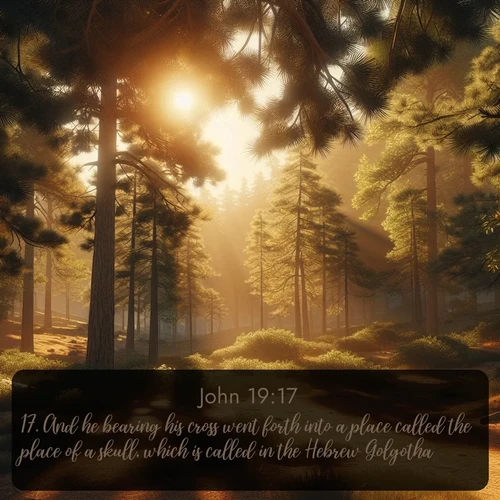Gospel of John 19:17 plusieurs versions / traductions
English Bible Translations
17. And he bearing his cross went forth into a place called the place of a skull, which is called in the Hebrew Golgotha:
17. They took Jesus therefore: and he went out, bearing the cross for himself, unto the place called The place of a skull, which is called in Hebrew, Golgotha:
17. And he went out with his cross on him to the place which is named Dead Man's Head (in Hebrew, Golgotha):
17. And he went out, bearing his cross, to the place called [place] of a skull, which is called in Hebrew, Golgotha;
17. And he bearing his cross went forth into a place called the place of a skull, which is called in the Hebrew, Golgotha:
17. and bearing his cross, he went forth to the place called [Place] of a Skull, which is called in Hebrew Golgotha;
German Bible Translations
17. Und er trug sein Kreuz und ging hinaus zur Stätte, die da heißt Schädelstätte, welche heißt auf hebräisch Golgatha.
17. Und er trug sein Kreuz selbst und ging hinaus zur sogenannten Schädelstätte, welche auf hebräisch Golgatha heißt.
French Bible Translations
17. Jésus, portant sa croix, sortit de la ville pour aller vers l'endroit appelé «le Crâne», qui se dit en hébreu Golgotha.
17. Jésus, portant sa croix, arriva au lieu du crâne, qui se nomme en hébreu Golgotha.
17. Jésus, portant sa croix, arriva au lieu du crâne, qui se nomme en hébreu Golgotha.
17. Et il sortit portant sa croix, et s'en alla au lieu appelé lieu du crâne, qui est appelé en hébreu Golgotha,
17. Et [Jésus] portant sa croix, vint au lieu appelé le Calvaire, et en Hébreu Golgotha;
17. Et Jésus, portant sa croix, vint au lieu appelé le Crâne, qui se dit en hébreu Golgotha;
Versions with Strong Codes
John 19 / KJV_Strong17. And[G2532] he bearing[G941] his[G848] cross[G4716] went forth[G1831] into[G1519] a place[G5117] called[G3004] the place of a skull,[G2898] which[G3739] is called[G3004] in the Hebrew[G1447] Golgotha: [G1115]
Strong Code definitions
G2532 kai/kahee apparently, a primary particle, having a copulative and sometimes also a cumulative force; and, also, even, so then, too, etc.; often used in connection (or composition) with other particles or small words:--and, also, both, but, even, for, if, or, so, that, then, therefore, when, yet.
G941 bastazo/bas-tad'-zo perhaps remotely derived from the base of G939 (through the idea of removal); to lift, literally or figuratively (endure, declare, sustain, receive, etc.):--bear, carry, take up. see G939
G848 hautou/how-too' contracted for G1438; self (in some oblique case or reflexively, relation):-her (own), (of) him(-self), his (own), of it, thee, their (own), them(-selves), they. see G1438
G4716 stauros/stow-ros' from the base of G2476; a stake or post (as set upright), i.e. (specially), a pole or cross (as an instrument of capital punishment); figuratively, exposure to death, i.e. self-denial; by implication, the atonement of Christ:--cross. see G2476
G1831 exerchomai/ex-er'-khom-ahee from G1537 and 2064; to issue (literally or figuratively):-come (forth, out), depart (out of), escape, get out, go (abroad, away, forth, out, thence), proceed (forth), spread abroad. see G1537 see G2064
G1519 eis/ice a primary preposition; to or into (indicating the point reached or entered), of place, time, or (figuratively) purpose (result, etc.); also in adverbial phrases:--(abundant-)ly, against, among, as, at, (back-)ward, before, by, concerning, + continual, + far more exceeding, for (intent, purpose), fore, + forth, in (among, at, unto, -so much that, -to), to the intent that, + of one mind, + never, of, (up-)on, + perish, + set at one again, (so) that, therefore(-unto), throughout, til, to (be, the end, -ward), (here-)until(-to), ...ward, (where-)fore, with. Often used in composition with the same general import, but only with verbs (etc.) expressing motion (literally or figuratively).
G5117 topos/top'-os apparently a primary word; a spot (general in space, but limited by occupancy; whereas G5561 is a large but participle locality), i.e. location (as a position, home, tract, etc.); figuratively, condition, opportunity; specially, a scabbard:--coast, licence, place, X plain, quarter, + rock, room, where. see G5561
G3004 lego/leg'-o a primary verb; properly, to "lay" forth, i.e. (figuratively) relate (in words (usually of systematic or set discourse; whereas G2036 and 5346 generally refer to an individual expression or speech respectively; while 4483 is properly to break silence merely, and 2980 means an extended or random harangue)); by implication, to mean:--ask, bid, boast, call, describe, give out, name, put forth, say(-ing, on), shew, speak, tell, utter. see G2036 see G5346 see G4483 see G2980
G2898 kranion/kran-ee'-on diminutive of a derivative of the base of G2768; a skull ("cranium"):-Calvary, skull. see G2768
G3739 hos/hos, including feminine ho ho probably a primary word (or perhaps a form of the article 3588); the relatively (sometimes demonstrative) pronoun, who, which, what, that:-one, (an-, the) other, some, that, what, which, who(m, -se), etc. See also 3757. see G3588 see G3757
G3004 lego/leg'-o a primary verb; properly, to "lay" forth, i.e. (figuratively) relate (in words (usually of systematic or set discourse; whereas G2036 and 5346 generally refer to an individual expression or speech respectively; while 4483 is properly to break silence merely, and 2980 means an extended or random harangue)); by implication, to mean:--ask, bid, boast, call, describe, give out, name, put forth, say(-ing, on), shew, speak, tell, utter. see G2036 see G5346 see G4483 see G2980
G1447 Hebraisti/heb-rah-is-tee' adverb from G1446; Hebraistically or in the Jewish (Chaldee) language:--in (the) Hebrew (tongue). see G1446
G1115 Golgotha/gol-goth-ah' of Chaldee origin (compare 1538); the skull; Golgotha, a knoll near Jerusalem:--Golgotha. see H1538
Prédications qui analysent les thèmes Évangile selon Jean 19
Thèmes : Jean 19: La remise en question; La crucifixion; La mort de JésusRelated Sermons discussing Gospel of John 19
Themes : Jean 19: La remise en question; La crucifixion; La mort de Jésussee also: Bible Key Verses ; KJV Bible Images, BBE Bible images

